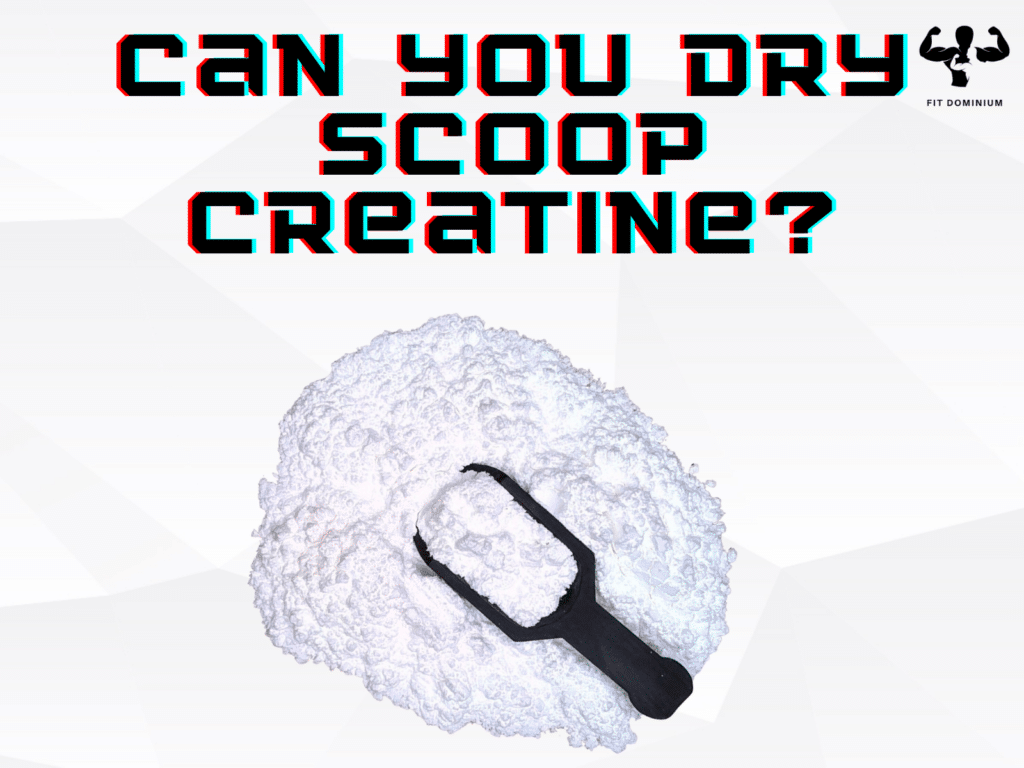
Creatine, a popular supplement among fitness enthusiasts, has been a staple in many athletes’ diets for decades. However, a recent trend has emerged, known as “dry scooping” creatine, raising concerns and curiosity in the fitness community. In this complete guide, we’ll talk about the risks of dry scooping creatine, why it’s becoming more popular, the right way to take it, and the many benefits of this powerful supplement.
Why Dry Scooping Creatine Can Be Dangerous
Creatine can also be taken “dry,” that is, without water or any other liquid. While this strategy may seem appealing at first because of its seeming efficiency, it comes with potential risks that every fitness enthusiast should be aware of:

Choking Hazard
Dry scooping creatine poses a serious choking hazard. Creatine powder is often fine and can easily become lodged in the throat, leading to choking and respiratory distress. Without proper dilution in liquid, the dry powder is more likely to stick to the throat’s walls, making it challenging to swallow safely.
Digestive Discomfort
Some people may experience digestive distress when consuming creatine in its unprocessed, powdered form. When creatine is not properly dissolved, it can be harsh on the stomach mucosa, causing stomach aches, bloating, and even diarrhea. Adding water to creatine improves absorption and reduces the risk of digestive issues.
Incomplete Absorption
There is a possibility that not all creatine supplements taken via dry scooping will be absorbed by the body. Creatine’s ability to promote muscle strength and endurance is enhanced by proper dilution, which ensures that the creatine particles are properly dissolved.
Kidney Strain
While creatine is considered safe when used as directed, dry scooping can potentially lead to higher concentrations in the body at once, placing excess strain on the kidneys. Properly mixing creatine with water dilutes its concentration, minimizing the risk of putting unnecessary pressure on the kidneys.
Why Is Dry Scooping Creatine Trending?
Social media trends and the culture of “influencers” are likely to blame for the rise of dry scooping creatine. Some people who are into fitness and have a lot of impact say that dry scooping makes the supplement work better and faster. But these claims aren’t backed up by science and don’t talk about the possible risks of this method.
Also, this is not a trend that is isolated creatine. People have also been dry scooping pre-workout and protein powder despite the dangers. For some reason, young lifters always seem to find the wrong way to take a supplement whether that be dry scooping or snorting instead of simply drinking it with water as intended.
The Correct Way To Take Creatine
To ensure the safe and effective use of creatine, follow these guidelines:
Step 1: Choose High-Quality Creatine
Creatine monohydrate is the most researched and confirmed form of creatine, therefore it’s a good idea to choose a renowned and high-quality brand. To guarantee purity and efficacy, you should only buy items that have undergone independent testing and certification.
Step 2: Measure The Correct Dose
Follow the recommended dosage instructions provided by the manufacturer or consult with a healthcare professional to determine the appropriate dosage based on your weight, age, and fitness goals.
Step 3: Mix With Water
Always mix creatine powder with water or a non-acidic beverage. Use a shaker bottle or stir the powder thoroughly to ensure complete dissolution. This step not only improves absorption but also helps prevent digestive discomfort.
Step 4: Stay Consistent
The effects of creatine are most clear when it is taken regularly over time. Creatine should be part of your daily routine, whether it’s before or after a workout, and you should take the right amount for the best effects.
What Is Creatine?

Creatine is a naturally produced substance that is a key part of how the body makes energy. It comes from the liver, kidneys, and pancreas, and you can also get it from foods like red meat and fish. When you eat creatine, it gets into your bloodstream and goes to your muscles, where it is stored as phosphocreatine.
During high-intensity activities like weightlifting or sprinting, the body needs a quick source of energy to power muscle contractions. Phosphocreatine comes into play at this point. When the muscles need energy, phosphocreatine quickly gives off a phosphate group, which turns into adenosine triphosphate (ATP), which is the main way cells get energy. The ATP then gives the muscle movements and other cellular processes the energy they need.
Because the body only has a limited amount of creatine on its own, athletes and exercise fans often take creatine supplements. By increasing the body’s creatine levels, you can enhance your ability to produce energy during intense exercise, leading to improved strength, power, and overall performance.
Creatine Benefits
Increased Muscle Strength and Power
Creatine supplementation has been extensively studied and proven to increase muscle strength and power, making it ideal for athletes and weightlifters looking to enhance their performance.
Enhanced Muscle Recovery
Research says that by replenishing the body’s stores of phosphocreatine, creatine helps speed up muscle recovery, allowing for more frequent and intense workouts.
Improved Muscle Volume and Hydration
Creatine promotes cellular hydration within the muscles, resulting in increased muscle volume, giving you a fuller and more defined appearance.
Final Verdict On Dry Scoop Creatine
Dry scooping creatine is a risky practice that may lead to choking, digestive discomfort, incomplete absorption, and kidney strain. Creatine powder should be blended into water or another non-acidic beverage before consumption. Overall, creatine is an excellent supplement to any exercise program because it increases muscle strength, power, and recuperation.
FAQs
Is creatine safe for everyone?
Can dry scooping creatine enhance its effects?
When is the best time to take creatine?
Can women use creatine?
Are there any side effects of creatine?
Michael Kirkland, is a trusted fitness expert and founder of FitDominium. With his extensive experience and commitment to helping others, Michael is the go-to source for reliable fitness advice and recommendations.
